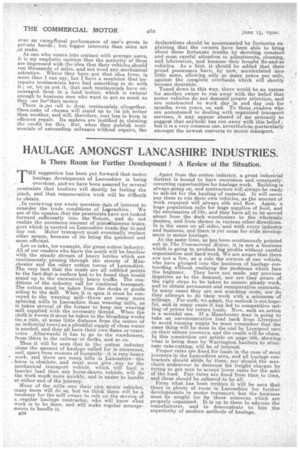HAULAGE AMONGST LANCASHIRE INDUSTRIES.
Page 18

If you've noticed an error in this article please click here to report it so we can fix it.
Is There Room for Further Development ? A Review of the Situation.
THE suggestion has been put forward that motor haulage . development of Lancashire is being . overdone, and•we. have been assured by several peesimists that hauliers will shortly be feeling the pinch, and that remunerative work will be difficult
to obtain. .
, In reviewing tne •whole question itAis of interest to consider the trade conditions of Laaacashire. We are of the opinion that the pessimists have not looked forward sufficiently into the sfuture, and do not realize the enormous-amount of naisceilaneous transport which is carried on Lancashire roads day in -and. day out. Motor transport must eventually replace other means, because of its being the quickest and most efficient.
Let us take, tor example, the great cotton industry.All of our readers who know the north will be familiar with the steady stream of heavy lorries which are .continuously. passing' through the streets of Manchester and the other cotton towns of Lancashire. The very fact that the roads are all cobbled points to the fact:that a. surface had, to be found. that would stanch up to the' excessively heavy traffic. The conditions of the industry call' for continual transport. The cotton must be taken from the docks or goods siding tO the mill. When it is spun it must be conveyed to 'the weaving mill—there are many more spinning mills in Lancashire than weaving -mills, As it takes severe' -of the former to keep one weaving mill supplied with. the necessary thread... When the cloth is woven it must be taken to the bleaching works (as a, rule, at some little distance from the centre of an industrial town) as a plentiful sapply of clean water is needed, and they all have their own dame or reservoirs. Afterwards it has te go to the warehouses, from there to the railway or docks, and so on.
Thus it will be seen that in the cotton industry alone-the amount of haulage Called for is enormous, and, apart from reasons of humanity—it is, very heavy work, and there are many hills in Lancashire—the ehorse is 'obsolete, and must soon give ,way to the mechanical transport vehicle, which will haul a heavier load than any horse-drawn vehicle, will do the -Work inuoh more quickly, and is easier to handle at either end of the journey.
Many of the mills own their own motor vehicles, many more will do so, but we think there will be a tendency for the mill owner to rely on the seryice of a regular haulage contractor, who will know w.hat work is to be done, and will make regular arrange
ments to handle it. . aaa
Apart from the cotton industry, a great industrial district is bound to have enormous and constantlyoccurring opportunities for haulage work. Building is always going on, and contractors will always be ready to sub-let for the hauling of material. It will never pay them to ran their own vehicles, as the amount of work required will always ebb and flow. Again, huge population calls for huge supplies of food, and the necessaries of life, and they have all to be moved about from the deck warehouses to the wholesale' dealers, and from thence in. various other directions. It is the same on all sides,' and with every industry and business, and there is yet room for wide develop• ment in motor haulage. At the Bathe time, as has been continuously pointed out in The Commercial Motor, it is not a business which is going to produce big profits without careful organization and hard work. We are aware that there are not a few, as a rule the -owners of one vehicle, who have plunged into the business of, haulage contracting wrthout realizing the problems which face the beginner. They have not made any previous inquiries as to the demand, nor are they aware of the right steps to be taken to ensure steady work, and to obtain permanent and remunerative contracts. In many cases they are not watching costs: nor do they, attempt to do their work with a. minimum of mileage. For such, we admit, the -outlook is not, hopeful, and. in many cases it has led to competitive cutting of prices for return loads. Now, such an. action is a suicidal one. If a Manchester man is going to take an uaremunerative load back from Liverpool to avoid running empty he must remember that the' same thing will be done intheend by Liverpool men on their return journeys, and the result will be ehaos. In this connection our article on page 458, shelving what is being done by Warrington haulier's to eliminate rate-cutting; will be of interest.
Proper' rates are fixed for loads in the case of most journeys in the Lancashire area, and all haulage contractors should abide by them, nor should the merchant, endeavour to decrease his freight charaes by trying to get men to accept. lower rates for the sake of the load'. Fair rates are fixed from time to time, and theseshould be adhered to by all. .
From what has been written it will be seen that there is plenty of room in Lancashire for further developments in, motor transport, but the business must be sought for by those concerns which. are properly organized. It is up to them to educate the manufacturer, and to demonstrate to him the superiority of modern methods of haulage.




























